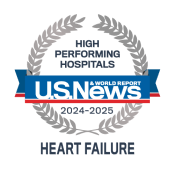Heart Fluid Retention

Imagine a jam-packed Interstate 95 at 5 pm on a weekday. With CHF, this traffic jam is what's happening inside your body.
When your heart isn't pumping like it should, it doesn't squeeze enough blood out with each heartbeat. But that blood has to go somewhere. So, it backs up into the veins that lead to your heart. Blood and fluids can also back up into your lungs, preventing oxygen from entering your blood and leaving you short of breath. Over time, this traffic jam of fluids can even impact your kidneys by causing them to retain both water and salt.
Am I retaining fluid?
Fluid retention can mean your CHF is getting worse, but the good news is there are several ways to spot it early.
- Weight change – This is one of the earliest. If you feel full without eating much, have loose stools, notice leg and belly swelling or gain two or more pounds in a day or five or more pounds in three days, contact your cardiologist immediately.
- Swelling – Swelling can occur everywhere from your belly to your legs and ankles.
- Bloating – Extra fluid can cause bloating in your stomach, as well as loss of appetite and nausea.
- Increased need to urinate – This can occur as your body tries to get rid of the extra fluid.
How can I reduce the extra fluid in my body?
Cardiologists and registered dietitians can help you manage fluid retention with medicine and nutrition plans. Here are a few steps you can take at home.
- Monitor your weight and lose weight if needed – Talk with your doctor about what your ideal weight is. Your "dry weight" is your regular weight when you are not retaining fluid.
- Cut back on salt/sodium – Salt is the main source of sodium, which is found naturally in and also added to many of the foods we eat. Sodium causes your body to hold on to water. Most nutrition plans for CHF patients limit sodium to 1500 to 2,000 milligrams or less per day.
- Take diuretics as directed – Diuretics, also known as water pills, help your kidneys remove extra water and salt from your body. They can also relieve swelling in your legs.
Call your doctor immediately if you gain two or more pounds in one day or five or more pounds in three days, have swelling that is getting worse, have trouble breathing or feel bloated or nauseous and have lost your appetite. To schedule an appointment or find out more, call 410-553-8146.

